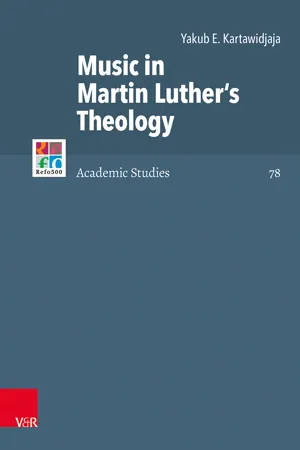
- 216 pages
- English
- PDF
- Available on iOS & Android
Music in Martin Luther's Theology
About this book
The study aims to analyse the impact of Luther's theology on his thoughts about music. It limits itself to an analysis of the topic by focusing on the three most important statements of Luther about music in his unfinished treatise ???? ??? ???????? [On Music]. The first statement is that music is "a gift of God and not of man" [Dei donum hominum est], second, music "creates joyful soul" [facit letos animos], and third, music "drives away the devil" [fugat diabolum]. The relation between these three statements to each other and to Luther's theology in general can be understood in connection with his personal experiences and commitments to music, which were undergirded by his theology. Luther, as a man of medieval times, took for granted the existence of the devil, and many of his writings contained frequent references to the personal attacks of the devil, where it influenced his thoughts about music.
Frequently asked questions
- Essential is ideal for learners and professionals who enjoy exploring a wide range of subjects. Access the Essential Library with 800,000+ trusted titles and best-sellers across business, personal growth, and the humanities. Includes unlimited reading time and Standard Read Aloud voice.
- Complete: Perfect for advanced learners and researchers needing full, unrestricted access. Unlock 1.4M+ books across hundreds of subjects, including academic and specialized titles. The Complete Plan also includes advanced features like Premium Read Aloud and Research Assistant.
Please note we cannot support devices running on iOS 13 and Android 7 or earlier. Learn more about using the app.
Information
Table of contents
- Cover
- Title page
- Copyright
- Table of contents
- Body
- Preface
- Abbreviations
- 1. Introduction
- 2. Luther as Musician
- 3. Luther on Music as a Gift of God
- 4. Luther on Music and the Devil
- 5. Luther on Music and the Joyful Soul
- 6. Luther and His Contemporaries
- 7. Conclusion
- Bibliography
- Primary Sources
- Secondary Sources